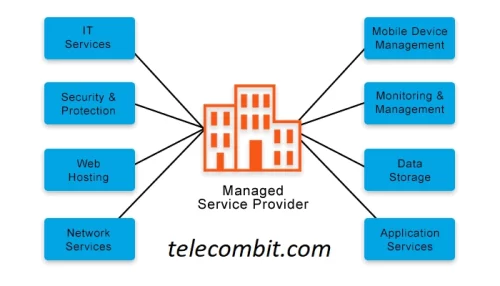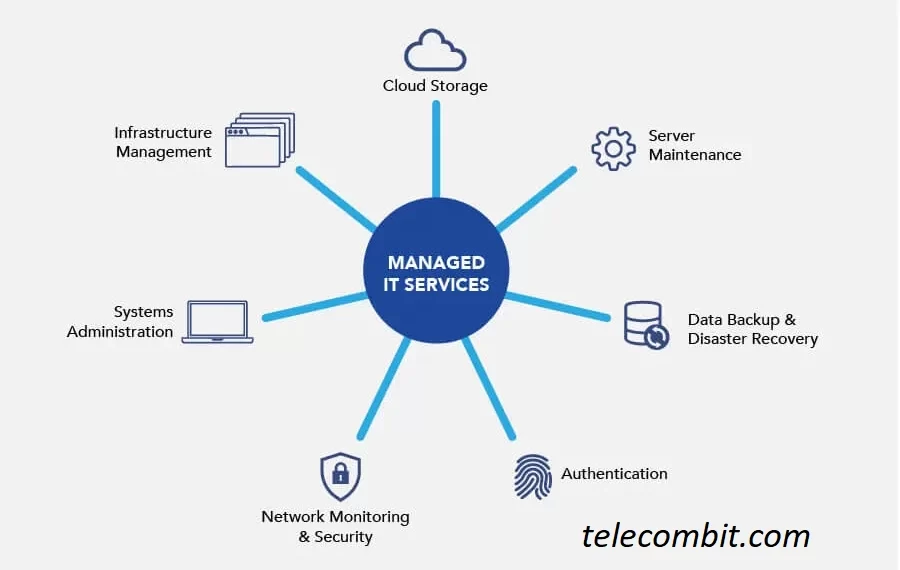Everything You Need to Know About Managed Service Providers
In today’s fast-paced business landscape, staying ahead of the competition is crucial. To achieve this, many companies are turning to managed service providers (MSPs) for their IT needs. Everything You Need to Know About Managed Service Providers. Managed service providers offer a range of specialized services and expertise to help businesses streamline operations, enhance security, and improve overall efficiency. In this article, we will explore the world of managed service providers, their benefits, and how they can transform your business.

What is a Managed Service Provider
A managed service provider is a third-party company that assumes responsibility for managing and maintaining a specific set of IT services for another organization. These services can include network monitoring, data backup and recovery, cybersecurity, cloud computing, software updates, and more. By outsourcing these tasks to an MSP, businesses can focus on their core competencies while leveraging the expertise of professionals who specialize in IT management.

Key Benefits of Managed Service Providers
2.1. Cost Savings: One of the primary advantages of partnering with an MSP is cost savings. MSPs offer a cost-effective solution for businesses as they eliminate the need for in-house IT staff, hardware, and infrastructure expenses. With a predictable monthly fee, organizations can budget effectively and avoid unexpected IT costs.
2.2. Proactive IT Support: MSPs provide proactive monitoring and maintenance to identify and resolve potential IT issues before they impact operations. This proactive approach helps minimize downtime, ensuring businesses can operate smoothly and efficiently. MSPs use advanced monitoring tools and technologies to detect and address issues in real-time, often preventing them from escalating into significant problems.
2.3. Enhanced Security: Cybersecurity threats are a significant concern for businesses today. Managed service providers employ robust security measures and implement best practices to safeguard sensitive data, protect against cyber attacks, and ensure regulatory compliance. They regularly update security systems, perform vulnerability assessments, and provide employee training to mitigate risks and keep your business protected.
2.4. Scalability and Flexibility: As businesses grow, their IT needs evolve. MSPs offer scalable solutions that can easily adapt to changing requirements. Whether it’s adding or removing users, expanding infrastructure, or adopting new technologies, MSPs can accommodate these changes efficiently. This scalability and flexibility enable businesses to scale up or down their IT services as needed, without incurring significant costs or disruptions.
2.5. Access to Expertise: MSPs consist of teams of highly skilled professionals with diverse expertise. By partnering with an MSP, businesses gain access to a pool of specialists who can provide strategic guidance, implement the latest technologies, and address complex IT challenges. Whether you need assistance with cloud migration, network design, or cybersecurity, MSPs can offer expert advice and support to optimize your IT environment.

How to Choose the Right Managed Service Provider
3.1. Assess Your Needs: Before selecting an MSP, assess your current IT infrastructure, identify pain points, and determine the specific services and support you require. This assessment will help you find an MSP that aligns with your business goals and can address your unique IT challenges effectively.
3.2. Experience and Expertise: Look for MSPs with a proven track record and experience in your industry. Consider their certifications, partnerships with technology vendors, and the range of services they offer. An MSP with expertise in your specific industry can better understand your unique requirements and provide tailored solutions.
3.3. Service Level Agreements (SLAs): Review the SLAs offered by potential MSPs. These agreements outline the scope of services, response times, and performance guarantees, ensuring your expectations are met. Pay attention to factors such as availability, support hours and escalation procedures to ensure that the MSP can meet your business’s specific needs and service level requirements.
3.4. Security Measures: Given the increasing cybersecurity threats, prioritize MSPs that have robust security protocols in place. Inquire about their data protection measures, incident response plans, and compliance with industry regulations. Look for MSPs that follow industry best practices, such as encryption, firewalls, intrusion detection systems, and regular security audits. Additionally, ensure that the MSP stays updated with the latest security trends and technologies to effectively protect your sensitive data.
3.5. Client References: Request references from existing clients to gain insights into the MSP’s reliability, responsiveness, and overall customer satisfaction. This feedback can help you make an informed decision about whether the MSP has a track record of delivering quality services and building strong relationships with their clients.
3.6. Communication and Collaboration: Effective communication is crucial for a successful partnership with an MSP. Assess the MSP’s communication channels and how they handle support requests and updates. Ensure that they have a dedicated support team and a clear process for issue resolution. Additionally, consider the MSP’s ability to collaborate with your internal IT team or other vendors to ensure smooth integration and efficient management of your IT environment.

Conclusion
Managed service providers offer businesses a comprehensive IT solution that drives efficiency, reduces costs, and enhances security. By outsourcing IT management tasks to MSPs, organizations can focus on their core competencies while leveraging the expertise of professionals who specialize in IT management. With benefits such as cost savings, proactive IT support, enhanced security, scalability, and access to expertise, partnering with an MSP can transform your business and help you stay ahead in today’s competitive landscape. When choosing an MSP, assess your needs, consider their experience and expertise, review service level agreements and security measures, and seek client references. By selecting the right managed service provider, you can unlock the full potential of your IT infrastructure and drive your business towards success.





